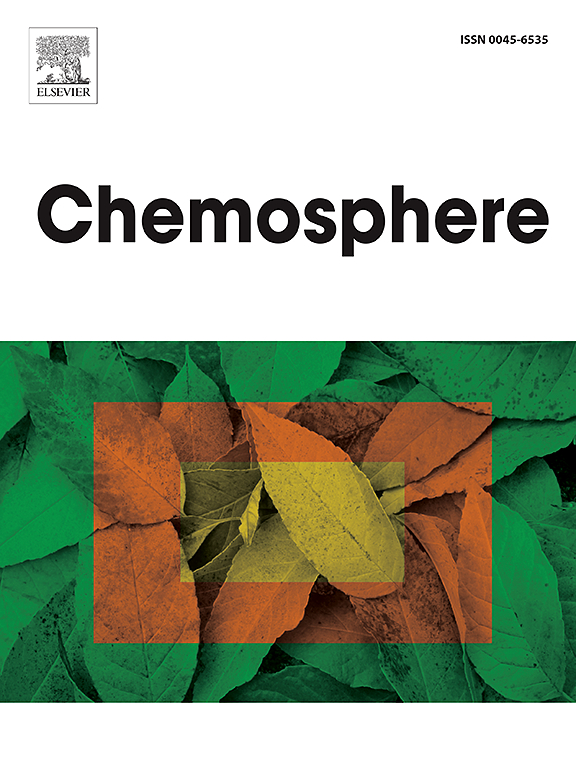鸡粪堆肥中碳介导的植物毒性调节途径。
IF 8.1
2区 环境科学与生态学
Q1 ENVIRONMENTAL SCIENCES
引用次数: 0
摘要
堆肥的植物毒性会影响有机肥料还田的安全性,从而阻碍育种周期,因此必须降低堆肥的植物毒性。堆肥的植物毒性是通过发芽指数(GI)来估算的,堆肥中的水性物质(有机物和离子)与发芽指数密切相关。本研究评估了不同植物来源的碳添加剂(蘑菇基质 (MS)、玉米秆 (CS) 和园林基质 (GS))对堆肥成熟参数(温度、pH 值、EC 值、C/N 值)、水性碳和氮物质含量、盐离子、重金属离子和微生物群的影响,尤其是对 GI 的影响。结果表明,所有添加剂都能明显改善 GI(85.25%-106.28%)。影响种子萌发的主要因素是 CM 堆肥中的 Mg2+ 和 SO42-,CM+MS 堆肥中的乙酸和 NH4+,CM+CS 堆肥中的腐殖酸,以及 CM+GS 堆肥中的溶解总氮。在堆肥过程中,通过减少水体中的碳氮物质(挥发性脂肪酸、NH4+、溶解总氮、氨基酸)和增加腐殖酸的含量,可以促进重金属钝化菌(芽孢杆菌)和有机物降解菌(Desemzia 和 Turicibacter)的生长,从而改善堆肥环境,为种子萌发提供有利条件,从而提高 GI。因此,在鸡粪堆肥过程中,GS 在加速有机物降解和改善 GI 方面表现出了最佳潜力。本文章由计算机程序翻译,如有差异,请以英文原文为准。

Carbon-mediated modulation pathways of phytotoxicity in chicken manure composting
Compost phytotoxicity affects the safety of organic fertilizers returned to the field, thus hindering the breeding cycle, so it is essential to reduce the compost phytotoxicity. The phytotoxicity of compost was estimated utilizing the germination index (GI) and the aqueous substances (organics and ions) present in compost correlated closely with GI. This study assessed the effect of carbon additives from different plant sources (mushroom substrates (MS), cornstalks (CS) and garden substrates (GS)) on maturity parameters (temperature, pH, EC, C/N), content of aqueous carbon and nitrogen matters, salt ions, heavy metal ions, and microbiome of piles when composting with chicken manure and especially focused on their effect on GI. Results showed that all additives significantly improved GI (85.25%–106.28%). The primary factors influencing seed germination were Mg2+ and SO42− in CM compost, acetic acid and NH4+ in CM + MS compost, humic acid in CM + CS compost, and dissolved total nitrogen in CM + GS compost. During composting, the growth of heavy metal passivating bacteria (Bacillus) and organic matter degrading bacteria (Desemzia and Turicibacter) can be promoted by decreasing aqueous carbon and nitrogen substances (volatile fatty acids, NH4+, dissolved total nitrogen, amino acids) and increasing the content of humic acid, which improved the composting environment and provided favorable conditions for the germination of seeds, thereby increasing GI. Therefore, GS showed the best potential for accelerating degradation of organic matter and improving GI during composting with chicken manure.
求助全文
通过发布文献求助,成功后即可免费获取论文全文。
去求助
来源期刊

Chemosphere
环境科学-环境科学
CiteScore
15.80
自引率
8.00%
发文量
4975
审稿时长
3.4 months
期刊介绍:
Chemosphere, being an international multidisciplinary journal, is dedicated to publishing original communications and review articles on chemicals in the environment. The scope covers a wide range of topics, including the identification, quantification, behavior, fate, toxicology, treatment, and remediation of chemicals in the bio-, hydro-, litho-, and atmosphere, ensuring the broad dissemination of research in this field.
 求助内容:
求助内容: 应助结果提醒方式:
应助结果提醒方式:


